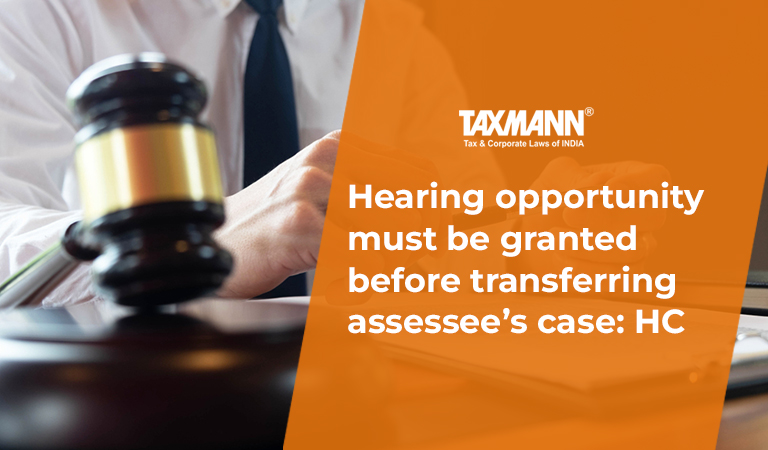Hearing opportunity must be granted before transferring assessee’s case: HC
- Blog|News|Income Tax|
- 2 Min Read
- By Taxmann
- |
- Last Updated on 26 May, 2022

Case Details: Nagindas Kasturchand and Bros. v. PCIT - [2022] 138 taxmann.com 365 (Gujarat)
Judiciary and Counsel Details
-
- J.B. Pardiwala & Ms Nisha M. Thakore, JJ.
- K.M. Parikh & Kuldeep K. Adesara, Advs. for the Petitioner.
- M.R. Bhatt, Sr. Adv. & Ms Maithili D. Mehta, Advs. for the Respondent.
Facts of the Case
The assessee had challenged the legality and validity of the order passed by the Assessing Officer (AO) under Section 127(2), transferring the case of the assessee from ITO Ward-2, Surendranagar to ACIT-Central Circle, Ahmedabad.
The case of the assessee was, a survey conducted under section 133A, and the case was selected for compulsory scrutiny. Later, a notice under section 143(2) was issued by AO, Surendranagar Circle.
The assessee contended a notice containing the reasons for transfer and should also have been given an opportunity of hearing before passing the transfer order. However, AO argued that Section 127 excludes an opportunity for hearing when the transfer is on account of the administrative exigency or convenience. Further, the assessee has no legal right of being assessed by any particular Assessing Officer.
High Court Held
The High Court held that Section 127 prescribes two pre-requisite conditions for exercising the power of transfer of a case from one AO to another AO, namely, the opportunity of hearing to the assessee and recording of reasons for the transfer.
Thus, the requirement of giving an opportunity to the assessee before passing an order of transfer under Section 127(2) cannot put the said power into the exclusive administrative domain of the authority but it symbolizes its quasi-judicial function.
Any order, even if it is administrative, has to meet the test of Article 14 of the Constitution and should be supported by reasons, which are not absurd or arbitrary.
An order of transfer of cases under Section 127(2) may cause some inconvenience to the assessee and, therefore, such order has to be passed after hearing and by giving reasons.
The requirement to give a hearing opportunity does fulfill the necessary ingredients of principles of natural justice, which have also been incorporated in the provision itself. Thus, the nature of the authority, which is exercised under Section 127(2) is not of much significance, i.e., whether it is taken as an administrative exercise of power or quasi-judicial exercise of power.
Disclaimer: The content/information published on the website is only for general information of the user and shall not be construed as legal advice. While the Taxmann has exercised reasonable efforts to ensure the veracity of information/content published, Taxmann shall be under no liability in any manner whatsoever for incorrect information, if any.

Taxmann Publications has a dedicated in-house Research & Editorial Team. This team consists of a team of Chartered Accountants, Company Secretaries, and Lawyers. This team works under the guidance and supervision of editor-in-chief Mr Rakesh Bhargava.
The Research and Editorial Team is responsible for developing reliable and accurate content for the readers. The team follows the six-sigma approach to achieve the benchmark of zero error in its publications and research platforms. The team ensures that the following publication guidelines are thoroughly followed while developing the content:
- The statutory material is obtained only from the authorized and reliable sources
- All the latest developments in the judicial and legislative fields are covered
- Prepare the analytical write-ups on current, controversial, and important issues to help the readers to understand the concept and its implications
- Every content published by Taxmann is complete, accurate and lucid
- All evidence-based statements are supported with proper reference to Section, Circular No., Notification No. or citations
- The golden rules of grammar, style and consistency are thoroughly followed
- Font and size that’s easy to read and remain consistent across all imprint and digital publications are applied



 CA | CS | CMA
CA | CS | CMA
